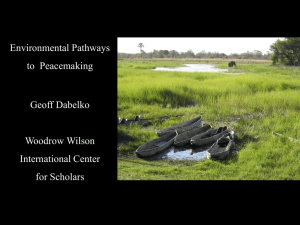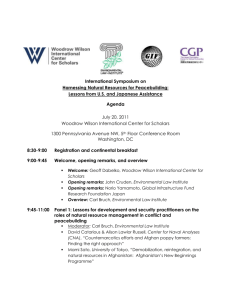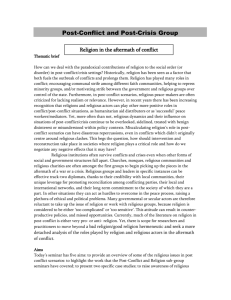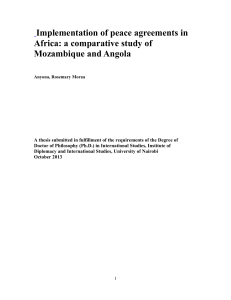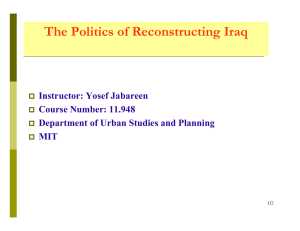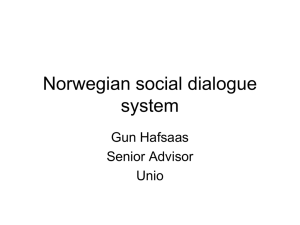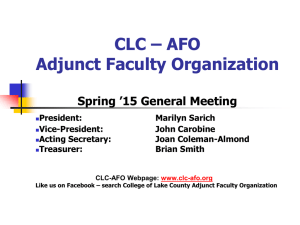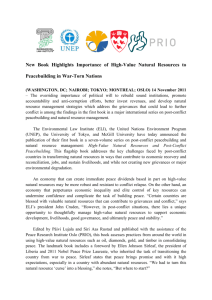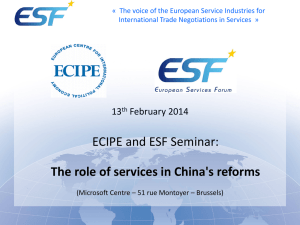Women in conflict and post
advertisement
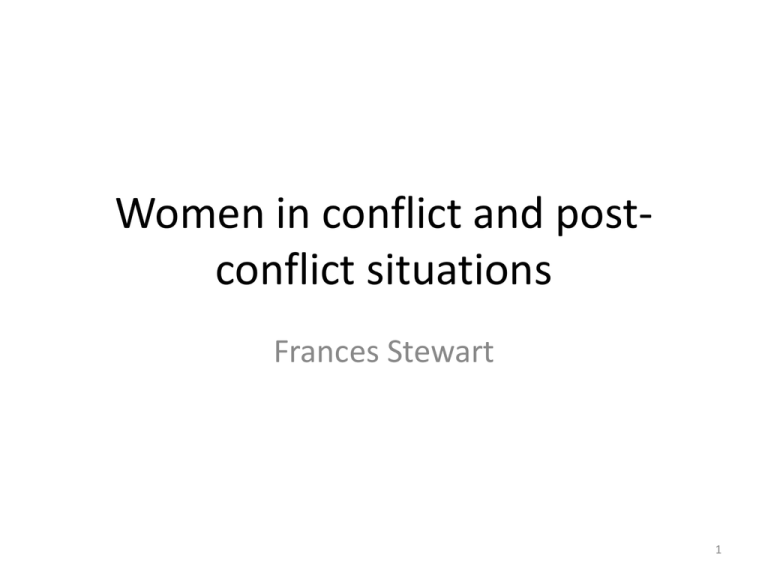
Women in conflict and postconflict situations Frances Stewart 1 Overview • Women are often portrayed as victims of conflict; and in large part they are. • But women are also agents, active participants in war. • Yet they are frequently largely neglected once peace occurs: 2 Women as victims of war • Rape is a weapon of war, used more against women than men. – 94% of displaced households in Sierra Leone subject to sexual assault; – a quarter to half women in Rwanda’s genocide were raped. • Women abducted to be army ‘wives’. • In countries like Angola, Mozambique. Kosova, widows accounted for as much as half adult female population at end of conflict. • Many women resort to prostitution to support their families. • Very high incidence of HIV/AIDs among female populations in conflict areas. 3 Women as participants • Women often active combatants – e.g. Algeria, El Salvador, Eritrea, Mozambique, Namibia, Nepal, Nicaragua, South Africa, Sri Lanka. – Survey of 55 countries found women active in 38. One tenth to one third of fighting forces; – Not only supportive services (cooks, messengers etc.) but also active fighting. – Eg. in southeastern Nigeria, women donated money and food to support combatants and some fought. – In Kashmir women helped: • separatists to escape • feeding combatants , providing shelters; • as couriers carrying messages, arms and ammunition under their veils • planted bombs, • Motives differ from men. As well as shared ideological or grievance motives, women in Guatemala sought to escape from hierarchical family structures , roles and values 4 Women in the formation of identities • Women contribute in major way to the identities and views of the next generation – not always in a peaceful direction. – For example, in Serbia, feminine ideals of patriotism were bolstered and the militarisation of masculinity promoted. – In Kashmir, indoctrinated women (and sons) into support for armed movement. 5 Women in the war economy • Take on new roles during war, as men join the fighting, leaving jobs unfilled and losses in family incomes – In the formal sector, women often take on roles previously held by men –marked in the two world wars in Europe. – Take responsibility for family income, becoming head of household, take up farming responsibilities, and new roles in the informal sector. E.g. in Cambodia and Sudan women-headed households increased by one third. 6 Women in post-conflict situations • Despite active role in war, women too often neglected in the post-conflict situation: – in peace negotiations; – demobilisation programmes; – and post-conflict reconstruction. 7 Peace negotiations (informal) • Women are often very active in civil society, peace movements: • in Colombia, women were responsible for complex networks of pro-peace movements; • in Northern Ireland, Burundi, Liberia, there were female coalitions across warring partners. • The Mano River Women’s peace Network (MARWOPNET) brought together women from Guinea, Liberia and Sierra Leone were important in peace-making, e.g. bringing the heads of state to the negotiating table in 2001. • Our research in Nigeria shows that women played an active role developing coalitions across fighting groups in the Aguleri and Umuleri conflicts in Southeastern Nigeria; conflicts within the Igbo community; and in Kaduna. 8 Yet frequently excluded from formal peace negotiations – in 2008, UNIFEM estimated that women account for less than 10% of members in formal peace negotiations and less than 2% of signatories to peace agreements. – A study of the Congo, Sudan and Uganda concluded that recognizing and supporting the role of women was a minor afterthought. – In Southeastern Nigeria, women were neither represented nor consulted in peace negotiations. 9 Political settlements often do improve role of women • Constitution making following conflict offers new opportunities. – E.g. Rwanda constitution requires 30% minimum female representation in parliament, and in 2003, women accounted for 49% of seats. – Steps to advance position of women also in Burundi, Mozambique, South Africa, Timor Leste. 10 But economic recovery programmes neglect women • Heavy emphasis on macro-stabilisation and pro market reforms – gender issues are ignored. • DDR and employment schemes largely directed towards men. • Economic infrastructure tends to come before social. • Women face problems in formal sector employment – as men return from conflict; • Pre-conflict gender attitudes resume. In Eritrea, women who had been barefoot doctors, dentists, administrators, teachers during the conflict could often not take on these roles post-conflict. In other cases, women in did find employment – e.g. textiles in Cambodia; tourism in Guatemala. • Often discrimination against women in post-conflict land settlement – e.g. Zimbabwe; El Salvador. • Farming assistance often bypasses women in extension, credit etc. • Training and retraining is biased towards men 11 What is needed – Formal recognition of what is needed in peacemaking and political systems is well advanced with many UN resolutions. Better enforcement needed – Recognition much less in relation to economic opportunities: assets ownership; employment; skills; formal sector medium sized credit. – Need first recognition; then programmes. 12 Women in deprived groups face worst situation • Treble deprivation: – (i) as members of a deprived group; – (ii) through general gender-based societal inequalities; and (iii)particularly strong gender discrimination within the group. • For example, in Guatemala female indigenous mean years of schooling is just 1.3 years compared with 4.6 for non-indigenous females and 5.5 for non-indigenous males. Such massive deprivation encourages support for resistance and rebellion, and also is likely to perpetuate deprivation via the next generation. 13 Conclusion • It is necessary to improve the position of deprived groups generally as well as of women. This is essential for sustaining peace. • Since women are active in supporting conflicts, it is not enough to conclude that giving women a greater role, politically will lead to peace. • It is also necessary to address the underlying grievances. 14
